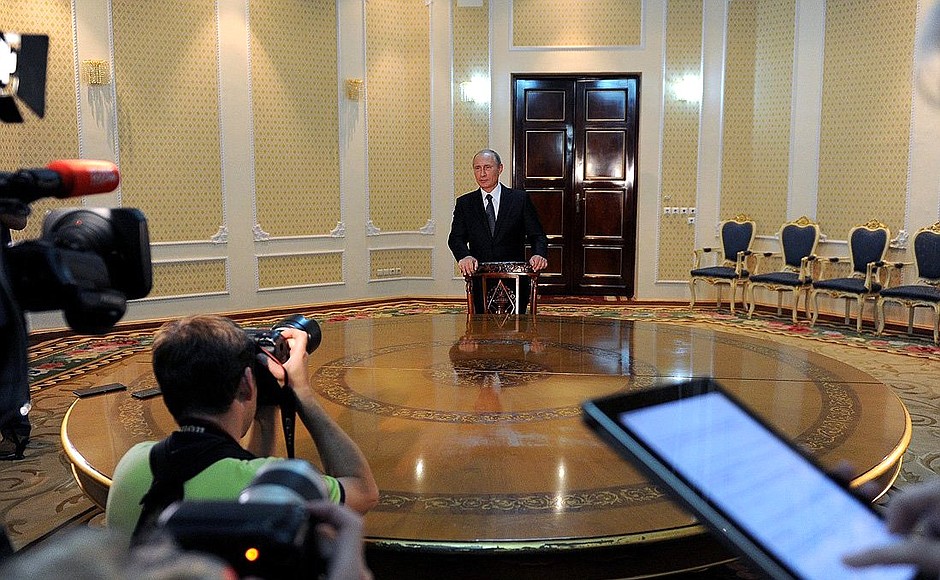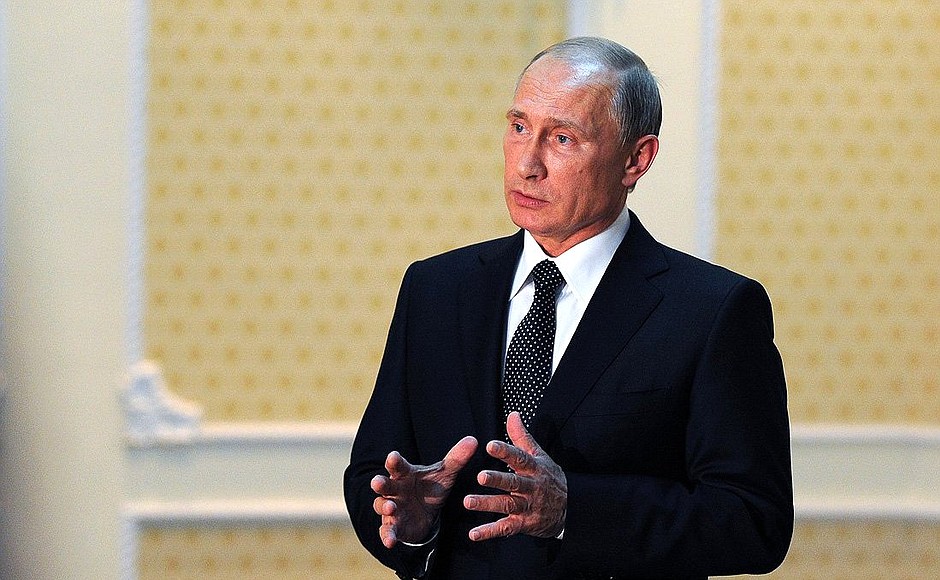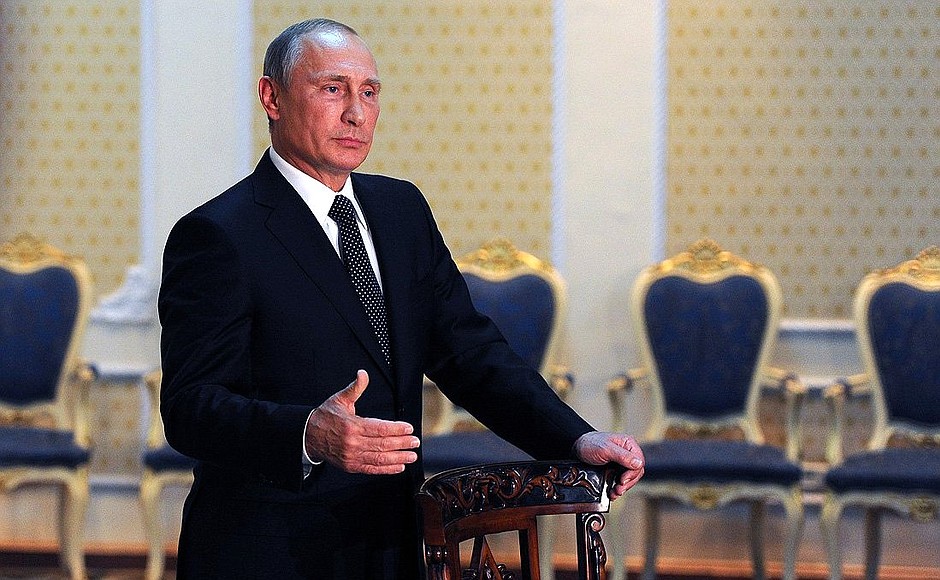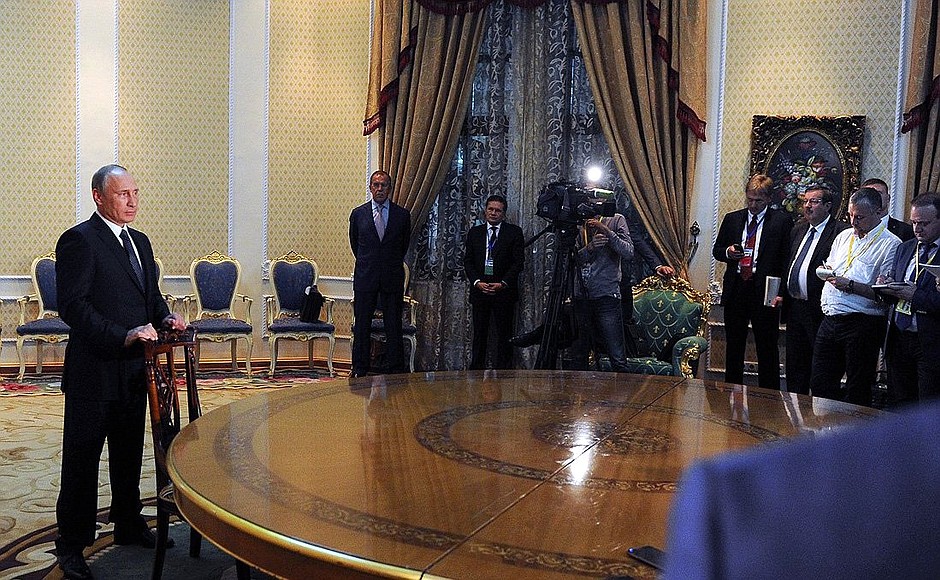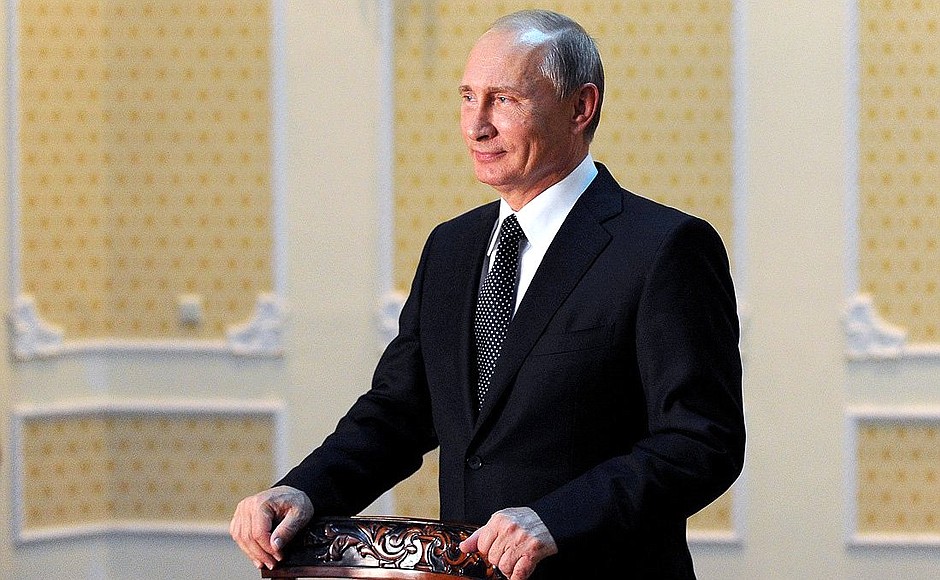See also
President of Russia Vladimir Putin: Good afternoon, please, go ahead.
Question: The SCO summits always draw a lot of attention, and given the current international situation, the attention is even greater this time. What are the summit’s main results in your view? Could you give some greater detail? Of course we all noted the statements some of the CIS countries’ leaders made today with regard to Ukraine. In how much detail was the Ukrainian crisis discussed at the summit and how close are the SCO countries’ leaders’ views on this matter?
Vladimir Putin: Regarding the summit overall, I think it was a big success. We reviewed what has been achieved so far in the economy, in coordinating our positions on the international stage, and discussed at the meeting in narrow format our assessments of current events and the threats that we see and that we must respond to in timely and competent fashion, above all the Afghanistan problem. I will not go into detail now, but you probably all saw it for yourselves anyway, and it is all reflected in the documents. We discussed other troubled parts of the world too, North Africa, Iraq of course, and other countries. Of course we also discussed the situation in Ukraine. I briefed my colleagues on what is happening there. Our common position (and I mean precisely our common position, as we share practically the same views and approach regarding this issue) is reflected in the relevant summit document. You can take a look at it for yourselves. It sets out everything in detail. I would not say that Ukraine was discussed as a separate issue of its own, rather it was examined as one of the issues we face today.
I had bilateral meetings with nearly all of my colleagues. I had very constructive meetings with the presidents of Kazakhstan, Uzbekistan, Kyrgyzstan, and Tajikistan, and with the various participants and members of the Shanghai Cooperation Organisation, including President of the People’s Republic of China Xi Jinping. We have highly developed bilateral relations with each of these countries. China, as you know, is our biggest trade and economic partner and our bilateral trade will reach a figure of nearly $90 billion this year. China is our biggest partner among individual countries. We also discussed our plans to enlarge the Shanghai Cooperation Organisation. You saw that we adopted documents today relating to procedures for accession of new member countries to the organisation.
”Our natural geographical proximity and Mongolia’s geographical location between its two biggest trade and economic partners – China on one side and Russia on the other – can encourage us into carrying out many joint projects, especially in infrastructure and the energy sector.“
Russia took over the organisation’s presidency for the coming year. We plan to hold a summit in Ufa next year. Over this time, we plan to hold more than 100 events of various types and level, economic and humanitarian. The summit will of course be the concluding event and will take place in July next year. Or course we will also work on the question of accepting new members into the organisation.
India and Pakistan have both expressed the desire to join the organisation. We will work with all of our partners and colleagues and with all participants in the organisation. Let’s see what results we can achieve by July next year. Overall, our delegation sees this summit as having been very productive and a big success.
Question: Continuing with the subject of the SCO summit, I want to clarify some of the bilateral talks’ results. In particular, did you reach any new agreements with China, and how did the trilateral meeting go with the presidents of China and Mongolia?
Vladimir Putin: We held this first ever trilateral meeting at Mongolia’s initiative. Excuse me for not mentioning this before. We agreed that we will continue meeting in this format. Russia proposed that we meet in trilateral format on the sidelines of SCO summits, all the more so as Mongolia is an observer country in the SCO and regularly attends the summits.
We have plenty to discuss of course in this trilateral format. Our natural geographical proximity and Mongolia’s geographical location between its two biggest trade and economic partners – China on one side and Russia on the other – can encourage us into carrying out many joint projects, especially in infrastructure and the energy sector. These are all things that we discussed.
Again, acting on Mongolia’s proposal, we also agreed that we will perhaps raise the level of our regularly functioning political instrument. The three countries’ representatives meet regularly at the level of ministerial department heads. We agreed to raise this level to that of say deputy minister or perhaps even minister.
We have an immense amount of work to do with our Chinese partners too. This includes work in the energy sector, machine building, aircraft manufacturing, and military technical cooperation. We went over our entire bilateral agenda, highlighted some things in particular, and agreed on what needs to be pushed through at the political level. Overall, we are happy at the way our relations with China are developing.
Question: The European Union has adopted a new package of sanctions. How do you assess them and how damaging will they be for Russia? Will there be any countermeasures, sanctions in response, and if so, what will they be? The new sanctions list the EU has announced includes politicians from Crimea, Donetsk and Lugansk peoples republics, and State Duma deputies too. [Vladimir] Zhirinovsky is on the list and so is [Vladimir] Vasiliyev. What are your thoughts on the matter?
Vladimir Putin: Russia’s position on sanctions is well-known. We have long since realised that sanctions as a foreign policy instrument are not very effective and almost never produce the hoped-for results, even when used against small countries, let alone against a country like Russia.
”We have an immense amount of work to do with our Chinese partners too. This includes work in the energy sector, machine building, aircraft manufacturing, and military technical cooperation. Overall, we are happy at the way our relations with China are developing.“
Of course, imposing sanctions always causes some damage, including for those who impose them. The sanctions against Russia will be no exception. We know the losses that European business and US business too will face and the damage done to trade relations as a result of the measures Russia has taken in response, but as we say in such cases, we have been left with no choice.
As for the latest round of sanctions, the use of this mechanism looks somewhat strange, even in a generally strange situation. I say this because, as you know, I had a telephone conversation with President of Ukraine [Petro] Poroshenko recently, and following on from that conversation I proposed an action plan for setting the conflict on track towards a peaceful settlement.
I even said at that moment in Ulan Bator, talking about these plans, that President Poroshenko and I were generally in agreement in our positions. Building on that conversation, I put forward a seven-point plan, which, as we saw, essentially became the base of the peace agreements signed at the contact group’s meeting in Minsk.
We are pleased to see that the process did begin and that hostilities have stopped, the militia have ceased hostilities and the Ukrainian army, to give the Ukrainian President his due, has also taken the required steps under the agreements. They have pulled back, in some places at least, and have pulled back their artillery and multiple launch rocket systems to a distance from where they cannot fire on populated areas.
The peace process has begun and so have the first contacts, and I think that the possibility has emerged that this process might produce a political settlement, even if just a temporary one for now. This is definitely a positive shift in the situation that has unfolded in southeast Ukraine.
But I cannot fathom what these latest sanctions are actually about. Perhaps it is not to someone’s liking that the process has taken a peaceful turn? I have already said many times that our Western partners pushed things towards an anti-constitutional coup in Kiev, and then supported the military operations in southeast Ukraine, and now, just when the situation has taken a turn towards a peaceful settlement, they are taking steps that practically aim to disrupt this peace process. Why are they doing this?
I can’t help but think the seditious thought that no one actually cares about Ukraine itself. They are just using Ukraine as an instrument to shake up international relations. Ukraine is being used as an instrument and has been made hostage to the desire of some players on the international stage to revive NATO say, not so much even as a military organisation, but as a key instrument in US foreign policy, in order for the US to consolidate its satellites and scare them with a threat from abroad. But if this is the case, this is a real shame because it means that Ukraine has essentially become hostage to another’s interests. I do not see anything good in this practice.
”Russia’s position on sanctions is well-known. We have long since realised that sanctions as a foreign policy instrument are not very effective and almost never produce the hoped-for results, even when used against small countries, let alone against a country like Russia. ”
As for our retaliatory measures, the Government is considering this. But if they are applied, then they will only be applied with the goal of creating better conditions for us. I feel there are certainly downsides to what was done to limit food imports for us as well, but they are minimal. There are far more positives for stimulating the development of our own agriculture, freeing the market from Western manufacturers that have thoroughly assimilated in our market, and meanwhile, they receive much more support and subsidies at a much higher volume than our agricultural producers.
Some people know, and others don’t, that subsidies per hectare of cultivated lands in the European Union are six times greater – I want to stress this – than in the Russian Federation. So the competition here was not very fair. But if the Government comes up with an idea that will help us somehow resolve our internal problems, then I suppose we should agree with it. But we will not do anything to harm ourselves. This concerns our response to sanctions.
As for the lists, I welcome this resolution by the European Union. The less our officials and heads of major companies go abroad and work on pressing matters instead, the better. The same is true of State Duma deputies, who need to communicate more frequently with their voters, rather than tanning somewhere at foreign resorts. Nevertheless, some questions arise; there are some names there that seem rather strange. I do not recall, I think it was one of the deputies, I think it was Babakov. And then the wording there…
Reply: For assets.
Vladimir Putin: Yes, for assets in Ukraine and in Crimea. But Ukraine’s current leadership also has many assets in Ukraine and in Crimea. Apparently, if you follow this logic further, they themselves need to be included in the sanctions list.
Moreover, it included the prime minister of the self-proclaimed Donetsk Republic. Our Western and Ukrainian partners insisted that officials from the self-proclaimed republics participate in the peace negotiation process. They came to us requesting that we use our influence to encourage them to participate.
We tried to do this. The prime minister is participating in this work and was accepted as a participant in the negotiations. But then they included him on the sanctions list. What is this, another attempt to somehow disrupt this peace process? Or what? What is this?
I would not want to think so. But there is certainly no logic in this whatsoever. And overall, you know, I am against these types of things – tit for tat, if they are not letting somebody in then we are not letting somebody in. We invite them to our nation; let them come and work. We are not going to refuse anyone. It is not even our choice. We will not follow that path. But if somebody does not want to work with us, there will always be alternatives.
Question: You said that you will not do anything to harm Russia with these sanctions; nevertheless, the limitations in food imports have already led to increased prices.
Vladimir Putin: You apparently got a little distracted, because I stated that certain aspects of this are undoubtedly negative. But if we look at the problem comprehensively, there are more positives than negatives.
Question: Yesterday, your aide said that [limitations] might involve cars, pharmaceuticals and…
Vladimir Putin: Listen. I am not getting involved in such technical work at this phase. It is true that the Cabinet is currently thinking this over, preparing certain suggestions. If my colleagues in the Cabinet come to the conclusion that a specific set of steps correspond to the interests of our economy, then we will do it. And if it’s just about showing off how tough we are, just to snap back and then to suffer damage as a result of that, we will not do it.
Ultimately, I wanted to convey our approach; as for the concrete steps that will be taken, if they are taken at all, we will see. Let the Cabinet think about it and make suggestions.
Thank you very much.
